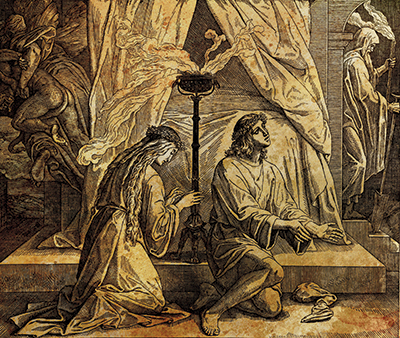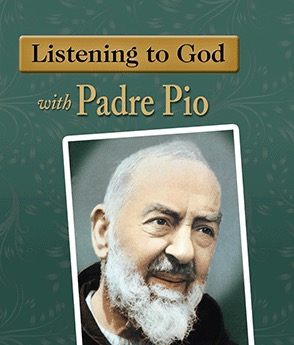The Theodicy of Tobit
Ministering and accompanying those who suffer
Deacon Daniel Lowery 1
“Why do bad things happen to good people?” This perennial question cries for an answer, an explanation of some kind, a theodicy. How can an all-knowing, all-powerful and all-good God permit suffering?
This is a particular challenge for deacons who encounter others who have experienced tragedies of one kind or another as well as those who are burdened by persistent suffering. Think, for instance, of the family that has lost a child as a result of a car accident, a drug overdose or suicide. Think, too, of those who are imprisoned, chronically jobless or marginalized by immigration status. Finally, think of those who find themselves in the proverbial pit of declining health, mental illness or loneliness. Providing hope for those who stand on the precipice of hopelessness can prove a daunting task.
We can be rendered speechless in the face of great suffering and yet feel compelled, nonetheless, to say something. All too often, our words can be unhelpful or even harmful: “I know how you feel.” “God has a plan.” “God will provide blessings in your life that will compensate for this moment of pain.” “You have been invited to share in the Paschal Mystery of Christ.” As well-intended as these and other such expressions might be, they are only marginally better than the answer implied in the question posed by Jesus’ disciples: “Rabbi, who sinned, this man or his parents, that he was born blind?” (Jn 9:2).
Given this, we would do well to think clearly about suffering, if for no other reason than to not find ourselves intoning empty platitudes to those who need something more. We can turn to Scripture, of course, but the Old Testament, in particular, can prove unhelpful in some situations.
The Deuteronomist tradition in the Old Testament associated suffering with sin, hence the disciples’ question concerning the man born blind. In this view, good things happen to good people and bad things happen to bad people. That’s just the way it is. God even punishes the “third and fourth generation” (cf. Dt 5:9).
God goes even further. He “hardens” pharaoh’s heart in the Book of Exodus and, elsewhere in the Jewish Scriptures, the hearts of whole peoples. Even the Book of Job, a text that focuses thematically on the problem of undeserved suffering, can be problematic. God is baited by Satan into using Job to prove a point; in the end, Job is subjected, not to comfort, but to a rant of truly biblical proportions. It’s no wonder that we struggle with the problem of suffering.
The Book of Tobit
There is another source in the Jewish Scriptures, however, that may be more helpful. The Book of Tobit is a relatively late addition to the canon, having been written, most likely, some 200 years before the birth of Jesus. It is a novella of sorts, a compelling story about an extended family that experiences great suffering.
It’s a simple story that reveals, nonetheless, a sophisticated theodicy. Following a brief synopsis of the Book of Tobit, four questions will be addressed in turn: What does the text say about suffering? What does the existence of profound suffering say about God? How does the Book of Tobit recommend that those who are suffering proceed? And what does the text say about our ministry to those who suffer?
………………………………………………………………………………………………………………………………………………………
The Lord Hears our Lamentations
Pope Francis spoke of the suffering of Sarah and Tobit in a homily on May 6, 2013, in the Chapel of Santa Marta:
“Tobit and Sarah; they do not curse, but they complain. Lamenting to God is not a sin. A priest that I know once said to a woman who complained to God about her misfortunes: ‘Madam, that is a kind of prayer, go ahead. The Lord feels and hears our lamentations.’
“Job … also lamented by cursing, not the Lord but the situation. Moreover, expressing sorrow ‘is human,’ also because there are many people who are in these situations of existential suffering. (Referring to a photo of a malnourished child on the cover of the Italian daily edition of L’Osservatore Romano.) How many are there like this? Are we thinking about Syria, refugees and the others? Are we thinking about hospitals, those suffering terminal illness?
“In Mark’s Gospel (12:18-27), the Sadducees turned to Jesus and presented the woman — like in a laboratory, very ascetic, a moral case. Instead, when we speak about these people who are in these extreme situations, we must do so with our hearts close to them. We must think about these people, whose suffering is so great, with our heart and with our flesh.
“In the Church, there are many people in this situation and, according to Jesus, we must pray for them. These suffering people must enter my heart, they must be an anxiety for me. My suffering brother, my suffering sister. This is the mystery of the Communion of Saints. Praying: Lord, look at him who cries and suffers. Let us pray, if I may say, with our flesh, not with ideas, pray with your heart.”
…………………………………………………………………………………………………………………………………………………..
The setting of the story is Assyria. The extended family featured are devout Jews who have been deported to Nineveh following the collapse of the northern kingdom of Israel in 721 B.C.
We learn that two distant relatives are suffering greatly, so much so that they both pray for death. An older man, Tobit, is blinded by bird droppings while dozing against a courtyard wall. Meanwhile, in a far-off city, Tobit’s young cousin, Sarah, is tormented by a wicked demon, Asmodeus, who brings sudden death to seven men betrothed, in turn, to Sarah, all on their respective wedding nights.
Now destitute, the blind Tobit dispatches his son Tobiah to secure funds long safeguarded by a relative in a distant place. The journey is a hazardous one, and Tobiah doesn’t know the way. A stranger named Raphael is then introduced. He offers to guide Tobiah to and from his father’s home.
At a key point in the story, Tobiah steps down the bank of the Tigris River to wash his feet, only to be assailed by a large fish. At Raphael’s urging, Tobiah hauls the fish ashore, where he cuts it open in order to retrieve its gallbladder, heart and liver as “useful medicines.”
Raphael then leads Tobiah to the home of Sarah’s father, where he meets his beleaguered kinswoman for the first time. Tobiah quickly falls in love with Sarah but is understandably reluctant to marry her. Raphael encourages Tobiah to proceed with the ceremony but to burn the fish heart and liver as incense at the foot of his bed on his wedding night. Asmodeus is thereby dispatched for good. Raphael then journeys home with Tobiah and Sarah where he encourages the young man to use the gall drained from the fish as a salve on his father’s eyes, and so Tobit is healed of his blindness. Only then is Raphael revealed as the answer to Tobit’s prayer and Sarah’s, too. As is true of all good stories, everyone then lives happily — and faithfully — ever after.
What the Text Says
Our first question then: What does the text say about suffering? Most importantly, there is no suggestion that the suffering experienced by Tobit and Sarah is due to personal sin. The Book of Tobit thus challenges the Deuteronomist understanding of suffering. Tobit and Sarah are both presented as good and faithful Jews. Nor is there any indication that God has permitted their suffering in order to make a lesson of them. They do not serve as “teachable moments” in God’s economy.

Instead, three distinct causes of suffering are featured. The first pertains to the background of the story. All of the protagonists live as exiles in Assyria, an analogue, perhaps, for the natural and man-made circumstances that function as background in the stories of so many who suffer in our own day. Indeed, far too many of our contemporaries have been rendered powerless in the face of impersonal forces of nature and history — that is, natural disasters of one kind or another, war, economic dislocation, institutional racism, etc.
Second, Tobit happened to be in the wrong place at the wrong time. He was blinded not by God as a consequence of personal sin but by happenstance, a reminder, it seems, that suffering is often random and arbitrary in nature. There need not be a “grand plan” as such, let alone a “grand plan” devised by God.
And third, suffering can, indeed, result from evil. Asmodeus and other demons, presumably, seem to have free reign in Sarah’s world. It’s Asmodeus who torments Sarah, however, not God. We know, too, that evil can be man-made. People corrupted by evil do evil things, and so people suffer. Evil persists in our world as well.
God and Suffering
And this, of course, begs our second question: What does the existence of profound suffering say about God? It is clear in the Book of Tobit that God responds to prayer, but he does so in a subtle way. God — in the person of Raphael, perhaps, or through the angel’s efforts — nudges, suggests, provides counsel and points the way. God does not presume. He does not treat Tobiah as a puppet, nor does he abrogate the laws of nature or the cultural, economic or political circumstances in which the story unfolds.
Raphael simply journeys with Tobiah. As one spiritual writer, Jesuit Father William Barry has argued, “the one action of God includes the free actions of all human beings. … Our faith and our experience tell us that we really are free agents, not pawns in the great chess game of Creation. If our actions are truly free, then, again in some mysterious fashion, God’s one action includes them and adjusts to them in order to attain God’s intention.” That one intention? “So that they may all be one, as you, Father, are in me and I in you, that they also may be in us” (Jn 17:21).
As noted by Martin Luther King Jr., “The arc of the moral universe is long, but it bends toward justice” in this context, God’s justice. We believe that suffering — even tragic suffering — does not have the final say. God reserves the final word to himself.
Proceeding with Suffering
Our third question: How should those who suffer proceed? It’s important to note, first, that Tobit, Sarah and Tobiah are ordinary people. Much of the Jewish Scriptures is about whole peoples and priests, prophets and kings. In contrast, the protagonists in the Book of Tobit are everyday people in every sense of the term. The lesson, of course, is that God is concerned about all of us as individuals. We should recall always — and especially in difficult circumstances — that God loves us and cares for us.
Second, Tobit and Sarah pray honestly. They both pray out of their desperation. Indeed, they pray for death. The end result, however, is not so much that God is moved to action, but that Tobit and Sarah are open to God’s subtle interventions in their lives, and so, too, is Tobiah, Tobit’s good and faithful son. And so we counsel prayer in the face of suffering. Prayer can keep our relationship with God alive, even in the worst of times, even in those moments when we are close to despair. We are reminded in prayer that God walks with us always.
Ministry to the Suffering
Our final question speaks to ministry: What does the text say about our service on behalf of those who suffer? In fact, the Book of Tobit doesn’t provide any fast and easy answers. It can, however, provide a corrective to certain misconceptions about God and his work in the world. God does not punish sin with suffering. He does not use us to provide a lesson for others. And he does not plan suffering. Instead, Raphael is revealed as an angel who has been directed to “journey” alongside Tobit and Sarah, as well as Tobiah.
It’s important to note that Jesus himself rarely responded to challenging questions of this kind with fast and easy answers. More typically, he responded with a question or two of his own or with an enigmatic parable. And when confronted by personal suffering, he responded — more often than not — with his presence, a healing touch and an assurance that the individual who stood before him was loved by the Father.
This, of course, goes to the heart of our understanding of the Incarnation. Jesus did not come to abolish grief and pain. He came, instead, to share with us all of the joys of human existence and our suffering, too. Most importantly, he came to share the Father’s love. Jesus is Emmanuel, God with us.
Journey with the Suffering
As deacons, we are often invited to journey with others, some of whom have been overwhelmed by great suffering. In these moments, words can sometimes fail us. In these moments, complex and well-reasoned theodicies simply won’t do. Like Raphael, we are invited, instead, to journey with those who are beset by grief and pain — sometimes in silence, sometimes with a simple word of friendship, and sometimes in certain grace-filled encounters — with the assurance that God walks with all of us, even in the darkest moments of our lives. In these challenging circumstances, deacons can sometimes serve as Raphaels to others who are in great need of God’s presence, and, in sharing God’s presence, we are sometimes privileged, albeit in a small way, to advance the arc of God’s work in creation.
DEACON DANIEL LOWERY, Ph.D., is a deacon in the Diocese of Gary, Indiana. Prior to retiring, he served as a professor and administrator at Calumet College of St. Joseph.
……………………………………………………………………………………………………………………………………………………
Book Helps Unite the Suffering with Padre Pio
 Deacon Lowrey reminds us: “Prayer can keep our relationship with God alive, even in the worst of times, even in those moments when we are close to despair. We are reminded in prayer that God walks with us always.”
Deacon Lowrey reminds us: “Prayer can keep our relationship with God alive, even in the worst of times, even in those moments when we are close to despair. We are reminded in prayer that God walks with us always.”
Padre Pio, who had a great love for all people, especially felt the pain of others, whether moral, physical or mental. He himself endured endless suffering from his ever-bleeding stigmata. Through his intercessory prayer, he wanted to share in the pains of those suffering and ask God to alleviate their suffering.
Eileen Dunn Bertanzetti’s book “Listening to God with Padre Pio” (OSV, $12.95) brings those who are suffering, in pain, in confusion to prayer with Padre Pio through meditations on his writings, experiences and advice. She reminds those who are suffering that Jesus suffers right along with them and for them.
…………………………………………………………………………………………………………………………………………………….






Comments are closed.